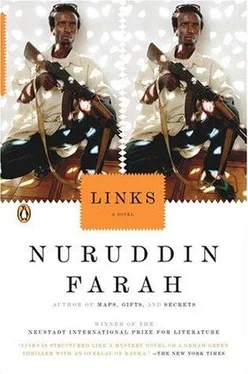“What about the money?” he asked the woman.
“We used every penny of it,” she told him.
He could only contemplate a life of regret, one in total ruins. If the woman was to be believed, the last words on his mother’s lips amounted to a curse. If he was being fed on half-truths, was it possible that even though the woman was as false as counterfeit money, the low-ceilinged house to which he had been taken really belonged to his mother’s housekeeper? And was this one reason why he hadn’t been allowed to go past the porch — because they were worried he might see many of his mother’s things, things the genuine housekeeper had appropriated or had been given by his mother? What gave this woman a certain credibility was that although she was a fake, she wore a dress his daughters had bought and sent as a gift to their grandmother.
Like it or not, he was visiting a land where demons never took a break. There was so much distrust that demons didn’t need to top things up, make sure there was enough to go round, give everyone his or her commensurate share of misery.
AT LONG LAST, THEY REACHED A GATE WITH A BROKEN SIGNBOARD, WITH THE words “The Sity’s General Cemetary” written in the shaky hand of a semiliterate. The road was choked with low shrubs, leaving only a narrow point of entry for the car. Traces of the old tarred road were visible, as was a broken-down shack, which once had served as a guardhouse. From the few times he had come here, Jeebleh remembered a caravan of vehicles waiting at the entrance. In those days, you had to present a death certificate from the municipality to be allowed to bury your dead here. Civil wars, anathema to bureaucracy, do away with the authority that is synonymous with normality. Civil wars simplify some matters and complicate others.
They drove for quite a while before the vehicle came to a stop at the command of the housekeeper, who saw the landmark she was looking for. The first to get out, Af-Laawe went around and gave the housekeeper a hand. Jeebleh got out and walked forward with a clubfooted gait. The huge loss was at last getting to him, weighing him down with more guilt. Had he been by himself, he would have sunk to his knees and stayed there, taking comfort from his humbled position. He heard his name spoken in a low whisper, and the housekeeper’s announcement: “There, I can see it!”
He took a good hold of himself and looked around. There was no mango tree with a sweet shade close by. Nor could he see four medium-to-large stones with writing on them to mark the grave, as Shanta had described. He didn’t know what Af-Laawe and the housekeeper expected him to do. He went on his knees, not because he wished to humble himself in prayer, but because walking or standing upright was proving difficult. Of course he knew that the moment toward which he had been moving all these years, to be face to face with revelatory death, was further away now than he had imagined. “This is not my mother’s grave,” he told the housekeeper.
“But it is,” she insisted.
“It isn’t!” he said.
Af-Laawe came nearer to find out what was happening, and the two musclemen with shades and guns approached as well. Jeebleh prepared for the moment when he would sink deeper into a reverie, and waited.
All the while, the woman pointed at a mound of earth that wasn’t his mother’s, saying, “There!” Who was she? Why was he still on his knees? From the way the woman indicated the mound, her forefinger extended, she might have been Columbus pointing at a new world beyond the horizon.
“That grave doesn’t belong to my mother,” he said.
Af-Laawe said, “Does a grave belong to the person in it, or to those claiming it with an authoritative apostrophe, as when someone says, ‘My mother’s grave’?”
Jeebleh wasn’t sure which Af-Laawe was getting wrong, his pronoun or where to place the apostrophe. Nor did he like Af-Laawe’s lip. But then what could he do about it, considering that there were two muscles who would kick him to death if he challenged him?
The woman came to him now, and towered above him. With her head inclined, her smile diffuse, she took his hand and led him to a mound that had collapsed on itself. And pointed at it. “Here she is!” She picked up a strip of zinc with his mother’s name recently inscribed in the hand of an autistic child. “Your mother’s here!” she said.
“My mother doesn’t belong in here!” he insisted.
With mouthy rudeness, Af-Laawe said, “She may not belong in the grave herself anymore, given her condition, but her bones do.”
One of the musclemen moved into Jeebleh’s field of vision, blocking it. He pretended to help Jeebleh to his feet, while his companion prodded Jeebleh sharply with the professional accuracy of a nurse giving an injection.
Jeebleh’s stomach turned, and he dropped deeper and deeper into nausea. He could not get up, and was so weak that he felt almost lifeless. By the time he managed to crawl closer to the mound and lay his head on it, the squeamishness had disabled his knees. Finally he fell, forehead first, as though he were dead.
“. . Murderers and those who strike in malice,
as well as plunderers and robbers…
A man can set violent hands against
himself or his belongings….
Now fraud, that eats away at every conscience,
is practiced by a man against another
who trusts in him, or one who has no trust.”
(CANTO XI)
Who, even with untrammeled words and many
attempts at telling, even could recount
in full the blood and wounds that I now saw?
Each tongue that tried would certainly fall short
because the shallowness of both our speech
and intellect cannot contain so much.
(CANTO XXVIII)
DANTE, Inferno

HOW DID HE GET HERE ?
He was in a restaurant, sitting by himself at a table, and before him was a cup of tea — which, he found by dipping in his finger and touching it to his lower lip, was highly sugared. There was a huge gap in his memory. He couldn’t recall what had happened between the moment his knees gave way, after the jab from the muscleman-cum-medico, and now.
He studied the curious faces surrounding him and concluded that he didn’t know who they were, and hadn’t the slightest idea how or why he had been brought to this place, or by whom. His memory had run out, abandoning him at the mound. But in his mind he replayed Af-Laawe’s rude remarks, which he hoped Af-Laawe would pay for sooner rather than later. Jeebleh remembered the supposed housekeeper pointing at a grave, her forefinger extended, and saying, “Your mother’s here!” Then Af-Laawe’s sass. . and then what? Did the jab come before or after he had had enough of Af-Laawe’s lip and the woman’s lies?
The mystery was now cast in a framed moment that was difficult to define. He had been on his knees when he felt the jab; he had smelled something noxious, although he couldn’t determine its nature. He had seen the shadowy presence of the muscleman in the corner of his vision, then a second muscleman’s hand insinuating itself into the lamp of his consciousness, making him go out as quickly as the flames of a fire extinguished with a miasmic liquid. He had heard the voices of the two men in shades, before a needle pricking him on the upper thigh interfered with his thinking. Now he felt his stomach to make sure that he hadn’t undergone a surgery in which an organ of his had been removed. He touched where the needle had prodded, and it ached. He hoped he wasn’t developing an exaggerated sense of paranoia, in which, like Shanta, he would detect the hand of the cartel everywhere.
Читать дальше













